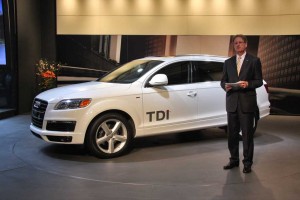
Audi of America CEO Johan de Nysschen, announcing the $50,900 price for the new Q7 TDI.
Audi will launch its first “clean” diesel, the Q7 TDI, later this month for $50,900, officials have announced, not including destination charges. The Q7 is expected to usher in an assortment of new Audi diesel-powered vehicles, despite growing skepticism about the role of the high-efficiency engines in the American marketplace.
Though Audi has steered clear of the hefty incentives becoming commonplace among luxury import makers, the company’s U.S. CEO, Johan de Nysschen, acknowledged that the automaker is hoping a federal tax credit of up to $1150 will help boost sales of the Q7 TDI and subsequent diesel offerings.
 “America’s reliance on gasoline-powered cars must come to an end,” said Audi of America’s chief executive, during a diesel “forum” marking the start of the annual New York International Auto Show. While de Nysschen acknowledged there’s no “silver bullet,” no single solution to the challenge of reducing America’s dependence on foreign oil, the automaker is hoping that diesel could become one of the more popular solutions.
“America’s reliance on gasoline-powered cars must come to an end,” said Audi of America’s chief executive, during a diesel “forum” marking the start of the annual New York International Auto Show. While de Nysschen acknowledged there’s no “silver bullet,” no single solution to the challenge of reducing America’s dependence on foreign oil, the automaker is hoping that diesel could become one of the more popular solutions.
Diesels have certainly gained traction in Europe, where they now account for about half of all new motor vehicles sold each year. In this country, diesels account for well under 5 percent of the market, though the market research firm, J.D. Power and Associates, has forecast the figure could reach 15, even 20 percent by the middle of the next decade.
The size and timing of that anticipated market has come under scrutiny. The plunge in petroleum prices hasn’t helped, and the situation is worsened by the fact that diesel usually costs at least 10 percent more at the pump. With enthusiasm dimming, a number of makers, ranging from General Motors to Honda, have either delayed or outright cancelled some of their planned diesel offerings.
“Clean diesel technology is too good to ignore,” said de Nysschen, a plaintive tone to his voice.
The new TDI technology clearly does have some endearing qualities, enhancing both performance and fuel economy. The Q7 will make a solid 225 horsepower and 406 pound-feet of torque, while delivering 27 mpg on the highway. Next in line, the Audi A3 TDI is expected to yield a whopping 44 mpg – as much as or better than similar-sized hybrids – when it reached Audi’s U.S. showrooms late this year.
“Our goal is to boost the average fuel consumption of our fleet by 20 percent by 2012,” said Audi U.S. diesel development chief, Gunter Schiele, “and TDI is a major part of reaching that goal.”
